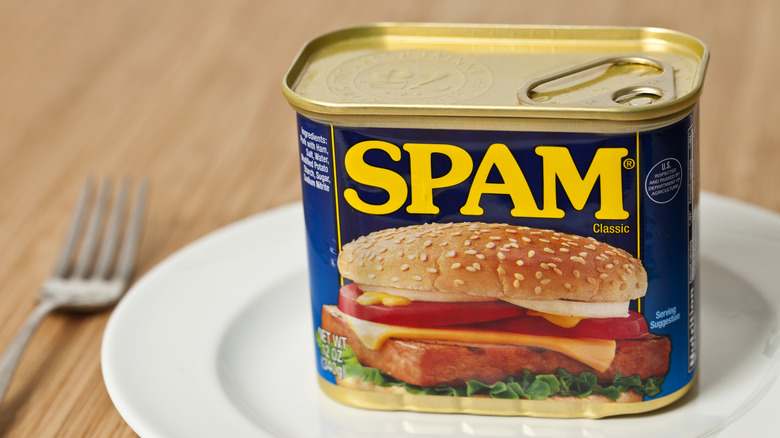What Does SPAM Stand For, Anyway?
We may receive a commission on purchases made from links.
Since SPAM's introduction, there have been as many myths spread about the processed meat product as it's grown in popularity. As of publication, over nine billion cans have been sold. Unleashed onto the world in 1937 by Hormel Foods, the brand's early marketing targeted American housewives with the promise of budget- and family-friendly meals. In WWII, the military fed soldiers overseas with SPAM, and by 1941 over 100 million pounds of the canned meat had been consumed by the troops. It was through G.I.s stationed in Asia and the Pacific Islands that SPAM first took root in those countries' cuisines and cultures where it is still extremely popular today. Part of that legend revolves around the origin of SPAM's name.
While it's no mystery what SPAM is made of — there are only six ingredients (pork with ham, salt, water, potato starch, sugar, and sodium nitrite) — the real mystery remains as to what those four capitalized letters stand for. The closest thing to an official statement is on Hormel's website where the brand teases that it's secret, but that "[o]ne popular belief says it's derived from the words 'spiced ham.'"
The SPAM museum in Austin tells the story of Hormel's 1936 New Year's Eve party where a product naming contest was won by an actor named Kenneth Digneau, who first combined letters from 'spiced' and 'ham' to make SPAM. He supposedly won $100 for his efforts, but no one in a position to do so is willing to confirm nor deny it.
SPAM's Probably Ambiguous Meaning
Whether there is any truth to the tale of Digneau's winning portmanteau, the real meaning of the name is lost to history. The only thing that is clear is that there have been plenty of guesses at what SPAM stands for. The brand's homepage features a header image of SPAM dishes being cooked overlaid with the motto "Sizzle Pork and Mmm," but that appears to be a modern take on the name rather than its original meaning.
According to Mental Floss, at one point Hormel claimed that it stood for "shoulder of pork and ham," which makes sense since the product is indeed made with that cut of meat. While SPAM's U.S. website does not mention what parts of the animal are used, the company's U.K. website specifies that "High[-]quality pork shoulder meat and ham (actually hand cut off the bone) are ground together with water, a little sugar, salt[,] and spice to be cooked in the can to seal in the goodness."
Other explanations for the acronym that have taken hold range from humorous to gross. These include Scientifically Processed Animal Matter, Salt Preserves Any Meat, Stuff Posing As Meat, and the simple but pointedly unpleasant Spoiled Ham. Another somewhat more believable meaning for the initials is Specially Processed American Meat, which inspired a play on words for an autobiographical performance by Jaime Sunwoo called "Specially Processed American Me." It explores the influence of SPAM on the military, Asian cooking, and Korean families
From military rations to foodie favorite
Korean cuisine was affected by the influx of SPAM into the region via military bases stationed there during the Korean War. At a time when people were forced by starvation to scavenge for food, leftover SPAM found from soldiers' rations was used to create a dish nicknamed "army-base stew." Properly known as budae jjigae, this comfort food recipe is a mix of traditional ingredients like rice cakes, fermented shrimp, kimchi, gochugaru, and ramen noodles, along with imports including SPAM, hot dogs, and American cheese.
Although the meaning of its name is uncertain, SPAM's impact on the eating habits of entire cultures across Asia and in the Pacific is without question. In places like Guam, the Philippines, Vietnam, and Japan, the canned meat product has fed generations and become part of the food landscape. From trendy sushi-inspired Hawaiian SPAM musubi to the classic Vietnamese baguette sandwich remade into a fried SPAM and egg banh mi, the canned meat has become the star of many international recipes. It turns out that it's far more adaptable than the jokers in "Monty Python's Flying Circus" could have ever imagined when they released their famous 1970s comedy sketch that made fun of it. There is even a 70th anniversary compendium for the ingredient simply called "The Book of SPAM."
SPAM's ongoing popularity is not surprising when you consider its versatility and long shelf life. Since it's already cooked and ready to eat, and its package lid is the best tool to cut SPAM, it's safe to say that convenience is the name of the game.



